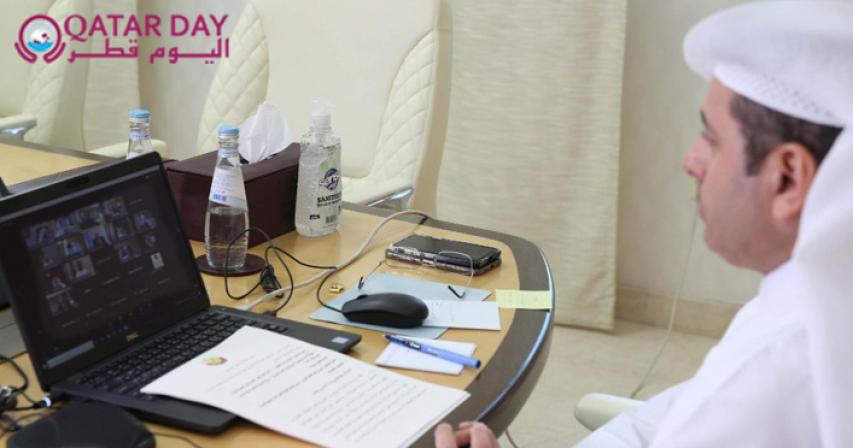HE Dr. Al Hammadi joins Education Ministers' meeting, praises Qatar's tireless effort to fight Covid-19
- 4 years ago

HE Dr Mohammed Abdul Wahed Al Hammadi, Minister of Education and Higher Education (MOEHE), praised the tireless efforts of Qatar to mitigate the impacts of the Novel Coronavirus (COVID-19), particularly in the education sector.
This came during the Extraordinary Virtual Conference of the Ministers of Education in the member states of the Arab Bureau of Education for the Gulf States (ABES), and in the presence of HE Dr Nayef bin Falah Al-Hajraf, GCC secretary general, HE Dr Madeeha bint Ahmed bin Nassir Al Shibaniyah, Oman's Minister of Education and the conference president, and HE Dr Ali Bin Abdul Khaliq Al Qarni, ABES general manager.
In his speech, HE made clear that MoEHE had quickly responded to the pandemic by adopting the "distance learning" system to keep the State's educational process uninterrupted. A full range of precautionary measures were put in place to ensure a safe environment for both students and teachers.
He stressed that Qatar managed to move to distance learning smoothly thanks to our rigid digital infrastructure and platforms, as well as the highly-qualified human resources. Moreover, our students showed exceptional abilities in dealing with technology.
He added that developing e-learning and promoting the digital transformation of educational environment have been integral parts of the Ministry's strategic plan since the education reform in Qatar was initiated. This all is guided by the insightful vision of State's leadership.
Elaborating on the Ministry's actions, Dr Al Hammadi explained that an integrated plan has been developed to implement distance learning for all academic years. The Ministry created online unified platforms, two TV channels and 19 YouTube channels, which broadcast videotaped lessons throughout the day. The lessons were made available for general education students, students with disabilities and specialized school students. Textbooks were also prepared in electronic formats and uploaded to those platforms.
In parallel, a number of awareness and training programs were broadcast on TV channels and social media to educate all involved parties about how to adapt to this new situation. The Ministry has also provided tablets and Internet connection for students who could not afford it. Special measured were taken for students who were was diagnosed positive for Coronavirus.
Dr Al Hammadi further pointed out that student assessment policy was modified to fit for the distance learning system. For grades 1 thought 11, the second term assessment was based on the weekly exercises given to students.
General secondary and adult education students, however, had to sit for the final exams in order to fulfil our commitment towards universities and maintain high-quality education output. Strict precautionary measures were taken to ensure the safety of students. These included maintaining social distancing at schools and on buses, reducing exam times and deploying a nurse in each school. Student and employees were also required to wear face masks and gloves.
Indicating the Ministry's future plan, Dr Al Hammadi said that an integrated plan was devised, which featured a number of assumptions of how next-year education will look like. Partial or full distance learning were among the options considered by the plan. He noted that "our planning was driven by an analysis of the current situation as well as the relevant best practices and studies."
In conclusion, Dr Al Hammadi appreciated the UN General Assembly's adoption of the proposal of Her Highness Sheikha Moza bint Nasser, the Chairperson of Education Above All and UN Sustainable Development Goals Advocate, to establish September 9th as International Day to Protect Education from Attack.
Source: Ministry of Education and Higher Education
Comments